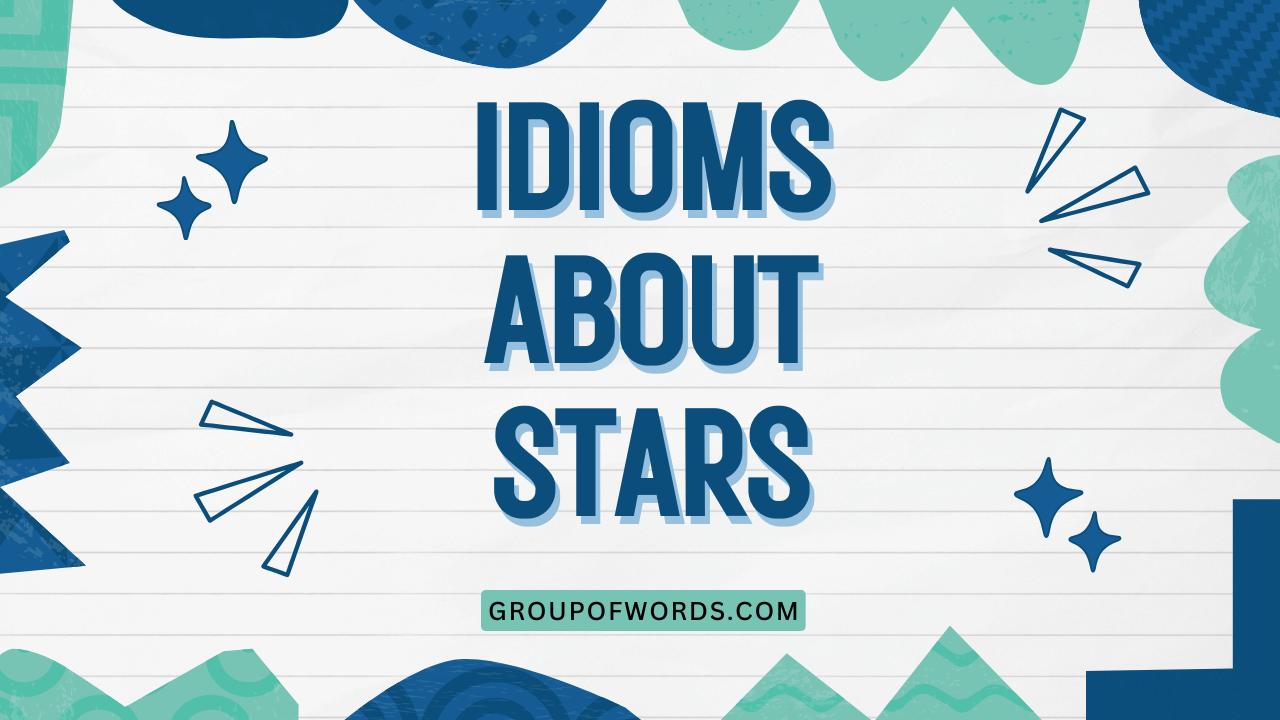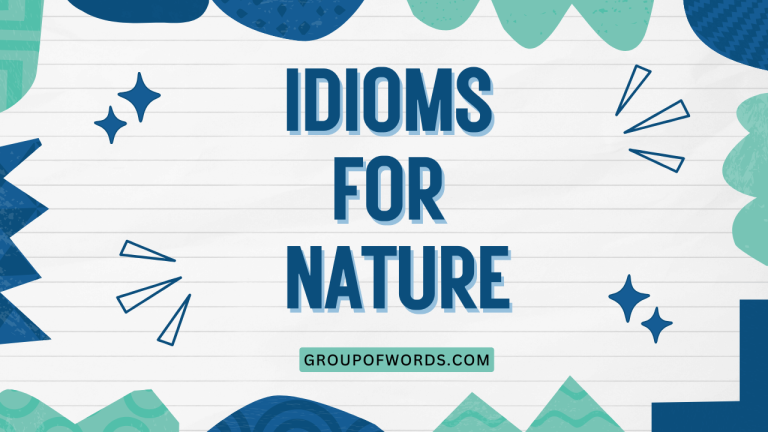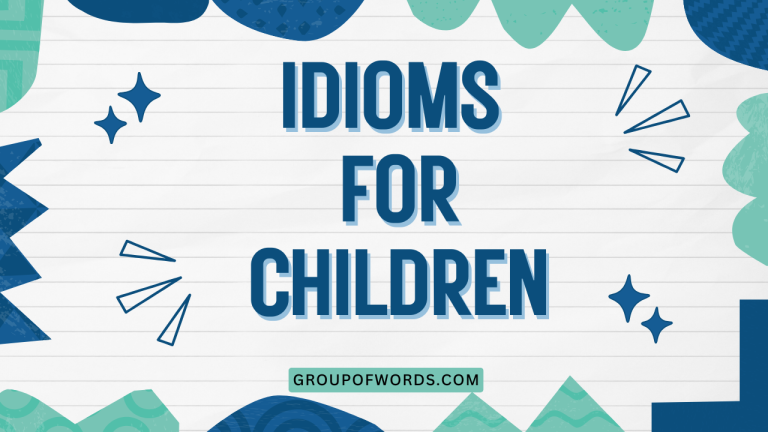Shine Bright: Mastering Idioms About Stars in English
Idioms are colorful expressions that add depth and nuance to the English language. Among the most evocative are those that draw on the imagery of stars, celestial bodies that have fascinated humanity for millennia.
Understanding these idioms not only enriches your vocabulary but also provides insights into the cultural perspectives and values embedded within the language. This article offers a comprehensive guide to star-related idioms, exploring their meanings, origins, and usage.
Whether you are an English language learner or a seasoned speaker looking to refine your skills, this guide will help you navigate the starry expanse of English idioms with confidence.
This article presents common idioms in an accessible way, complete with examples and practice exercises. By the end, you’ll be able to recognize and use these idioms effectively in various contexts, enhancing your communication skills and adding a touch of brilliance to your speech and writing.
Table of Contents
- Introduction
- What are Idioms About Stars?
- Structural Breakdown of Star Idioms
- Types and Categories of Star Idioms
- Examples of Star Idioms
- Usage Rules for Star Idioms
- Common Mistakes with Star Idioms
- Practice Exercises
- Advanced Topics: Star Idioms in Literature and Culture
- Frequently Asked Questions (FAQ)
- Conclusion
What are Idioms About Stars?
Idioms about stars are figurative expressions that use the imagery of stars to convey meanings beyond their literal astronomical sense. These idioms often reflect cultural beliefs, historical contexts, and shared human experiences associated with stars – such as guidance, destiny, fame, and pain.
They are a subset of idioms in general, which are phrases whose overall meaning is different from the literal meanings of the individual words they contain.
Classification: Star idioms fall under the broader category of figurative language, specifically idioms. Within this category, they represent a thematic group centered on celestial objects, particularly stars. This thematic grouping provides a shared conceptual framework that influences their interpretation and usage.
Function: The primary function of star idioms is to add color, emphasis, and emotional resonance to communication. They allow speakers and writers to express complex ideas and feelings in a concise and memorable way. By invoking the symbolic power of stars, these idioms can evoke a range of emotions, from hope and inspiration to despair and misfortune.
Contexts: Star idioms are used in a wide variety of contexts, including everyday conversations, literature, films, and music. Their suitability depends on the intended audience and the overall tone of the communication. While some star idioms are relatively common and universally understood, others may be more culturally specific or context-dependent. For instance, “star-crossed lovers” is widely recognized due to Shakespeare, while other idioms might be less common.
Structural Breakdown of Star Idioms
The structure of star idioms can vary, but they generally consist of a combination of words that include the word “star” or a related term (e.g., “stars,” “starry”). Understanding the structural elements can help in deciphering their meaning and using them correctly.
Common Structures:
- Verb + Star + (Optional Words): This structure involves a verb followed by the word “star” and potentially other words to complete the idiom. Examples include “see stars” and “reach for the stars.”
- Adjective + Star: This structure uses an adjective to modify the word “star,” creating a specific figurative meaning. An example is “star-crossed.”
- Phrase + Stars: This structure involves a phrase that includes the word “stars,” often expressing gratitude or luck. An example is “thank your lucky stars.”
- Passive Voice + Star: This structure uses the passive voice to describe something predetermined or destined. An example is “written in the stars.”
Grammatical Components: Star idioms typically involve nouns (star), verbs (see, reach), adjectives (lucky, star-crossed), and prepositions (in, for). The grammatical relationships between these components contribute to the overall meaning of the idiom. For example, in “reach for the stars,” the verb “reach” indicates an action, while the prepositional phrase “for the stars” specifies the goal or aspiration.
Word Order: The word order in star idioms is generally fixed, meaning that changing the order of the words can alter or destroy the idiom’s meaning. For example, “see stars” has a specific meaning related to pain or shock, while “stars see” is grammatically incorrect and nonsensical in this context.
Types and Categories of Star Idioms
Star idioms can be categorized based on their meanings and the emotions or concepts they convey. Here are some common types:
- Idioms of Aspiration and Ambition: These idioms express the desire to achieve great things or pursue lofty goals.
- Idioms of Fate and Destiny: These idioms relate to the idea that events are predetermined or influenced by cosmic forces.
- Idioms of Luck and Gratitude: These idioms express thankfulness for fortunate circumstances.
- Idioms of Pain and Disorientation: These idioms describe the sensation of being hurt or confused.
- Idioms of Fame and Success: These idioms refer to people who are prominent or successful in their fields.
Rising Star
A “rising star” refers to someone who is quickly gaining popularity and success in a particular field. This idiom is often used to describe young or new talents who show great promise.
See Stars
To “see stars” means to experience a sudden, sharp pain or shock that causes one to feel disoriented or dizzy. It is often used to describe the immediate aftermath of a physical blow.
Thank Your Lucky Stars
To “thank your lucky stars” means to express gratitude for a fortunate outcome or to acknowledge that one has narrowly avoided a negative experience. It implies a sense of relief and thankfulness.
Written in the Stars
If something is “written in the stars,” it means that it is predetermined or destined to happen, often suggesting that fate has a hand in the outcome. This idiom conveys a sense of inevitability.
Reach for the Stars
To “reach for the stars” means to set ambitious goals and strive to achieve great things, even if they seem difficult or impossible. It encourages one to aim high and pursue one’s dreams.
Star-Crossed
“Star-crossed” typically describes a relationship that is doomed to fail due to external circumstances or fate. It is often used in the context of romantic relationships that are ill-fated.
This idiom is famously associated with Shakespeare’s Romeo and Juliet.
Examples of Star Idioms
The following tables provide examples of star idioms categorized by their type. Each example is accompanied by a sentence that illustrates its usage and meaning.
Table 1: Idioms of Aspiration and Ambition
This table showcases idioms that relate to high aspirations and the pursuit of ambitious goals. These idioms encourage individuals to strive for excellence and to not be limited by perceived boundaries.
| Idiom | Meaning | Example Sentence |
|---|---|---|
| Reach for the stars | Set ambitious goals and strive to achieve great things | Even though it seemed impossible, she decided to reach for the stars and apply to Harvard. |
| Hitch your wagon to a star | Associate yourself with someone successful to improve your own chances | He decided to hitch his wagon to a star by becoming an apprentice to the renowned chef. |
| Aim for the stars | Set high goals; try to achieve something great | The coach always told his team to aim for the stars, even if they didn’t win every game. |
| Shoot for the stars | Attempt to achieve something very ambitious | If you shoot for the stars, you might land on the moon. |
| The sky’s the limit | There is no limit to what can be achieved | With her talent and dedication, the sky’s the limit for her career. |
| Set your sights high | Have ambitious goals and expectations | If you want to be successful, you need to set your sights high and work hard. |
| Reach new heights | Achieve a higher level of success or accomplishment | The company is expected to reach new heights with its innovative products. |
| Dream big | Have ambitious dreams and goals | They encouraged their children to dream big and never give up on their aspirations. |
| Go the distance | Persist and complete a task or goal | If you’re willing to go the distance, you can achieve anything you set your mind to. |
| Climb the ladder | Advance in a career or social hierarchy | She was determined to climb the ladder in the corporate world. |
| Make a name for oneself | Become famous or well-known through one’s achievements | He worked tirelessly to make a name for himself in the industry. |
| Rise to the top | Achieve the highest position in a field or organization | Through hard work and dedication, she rose to the top of her profession. |
| Break the mold | Do something differently and innovatively | He wanted to break the mold and create a unique product. |
| Push the envelope | Go beyond the limits of what is considered normal or acceptable | The artist was known for pushing the envelope with his controversial performances. |
| Take the world by storm | Become very successful or popular very quickly | The new band took the world by storm with their debut album. |
| Blaze a trail | Be a pioneer or innovator in a particular field | She blazed a trail for women in science with her groundbreaking research. |
| Leave a mark | Have a lasting impact or influence | He wanted to leave a mark on the world through his charitable work. |
| Go places | Be successful in the future | With her talent and drive, she’s definitely going to go places. |
| Set the world on fire | Achieve great success and excitement | The young entrepreneur was determined to set the world on fire with his innovative startup. |
| Conquer the world | Achieve widespread success and recognition | The athlete trained relentlessly, hoping to conquer the world at the Olympics. |
Table 2: Idioms of Fate and Destiny
This table contains idioms that reflect the belief in fate or destiny, suggesting that certain events are predetermined. These idioms often imply that human actions are influenced by forces beyond our control.
| Idiom | Meaning | Example Sentence |
|---|---|---|
| Written in the stars | Predetermined by fate or destiny | Their meeting seemed accidental, but some say it was written in the stars. |
| Meant to be | Destined to happen | Despite the obstacles, they believed they were meant to be together. |
| In the cards | Likely to happen; destined | Winning the lottery wasn’t in the cards for him, despite buying tickets every week. |
| Kismet | Destiny; fate | They met by chance, and she believed it was kismet that brought them together. |
| Fated to | Destined to experience something, often negative | The ancient prophecy said they were fated to fail in their quest. |
| It was in the stars | Destined to happen | Their paths crossed unexpectedly; it was in the stars, they said. |
| Destiny calls | Fate is beckoning or demanding | He felt that destiny calls him to embark on a journey of self-discovery. |
| The hand of fate | The influence of destiny on events | They attributed their success to the hand of fate guiding them. |
| Predestined path | A predetermined course of life | She felt she was on a predestined path to becoming a doctor. |
| Star-crossed lovers | Lovers whose relationship is doomed to fail | Their families were enemies, making them star-crossed lovers. |
| What will be, will be | Whatever is destined to happen will happen | They tried to change the outcome, but realized that what will be, will be. |
| The die is cast | A decision has been made and cannot be changed | Once he submitted his resignation, the die was cast. |
| Written in stone | Permanent and unchangeable | The rules of the competition were written in stone and could not be altered. |
| Meant for each other | Destined to be together | Everyone could see that they were meant for each other. |
| Bound to happen | Certain to occur | With the storm approaching, flooding was bound to happen. |
| A twist of fate | An unexpected event that changes someone’s life | By a twist of fate, he won the lottery and became wealthy. |
| The stars align | Circumstances are favorable for something to happen | They waited for the stars to align before launching their new product. |
| Foregone conclusion | An inevitable result | With their superior resources, their victory was a foregone conclusion. |
| Inescapable destiny | A fate that cannot be avoided | He tried to run from it, but his inescapable destiny caught up with him. |
| Preordained outcome | A result that has been determined in advance | The election results seemed to be a preordained outcome. |
Table 3: Idioms of Luck and Gratitude
This table presents idioms used to express gratitude for good fortune or to acknowledge a stroke of luck. These idioms are often used in situations where someone has narrowly avoided a negative outcome or has experienced an unexpected benefit.
| Idiom | Meaning | Example Sentence |
|---|---|---|
| Thank your lucky stars | Be grateful for good fortune | I thank my lucky stars that I didn’t miss my flight. |
| Lucky break | A fortunate opportunity or event | Getting that job was a lucky break for him. |
| Good fortune | A positive outcome or lucky event | They celebrated their good fortune with a lavish party. |
| Bless your heart | Express gratitude or sympathy | “You brought me flowers? Bless your heart!” she exclaimed. |
| Providence smiled upon | Divine intervention or luck favored | Providence smiled upon their efforts, and they succeeded against all odds. |
| Count your blessings | Be grateful for what you have | During tough times, it’s important to count your blessings. |
| Be born under a lucky star | Be destined for good fortune | She seems to be born under a lucky star, always succeeding in everything she does. |
| Fortune smiles on | Luck favors someone | Fortune smiles on those who are prepared to take risks. |
| A stroke of luck | A sudden and unexpected piece of good fortune | Finding the lost keys was a stroke of luck. |
| Out of the blue | Unexpectedly; without warning | He got the job offer out of the blue. |
| A gift from the gods | An unexpected and valuable benefit | Winning the scholarship was a gift from the gods. |
| By the grace of God | Through divine intervention or mercy | They survived the accident by the grace of God. |
| A happy accident | A fortunate event that occurs unintentionally | Meeting her at the conference was a happy accident. |
| Saved by the bell | Rescued from a difficult situation at the last moment | He was failing the class, but he was saved by the bell when the teacher offered extra credit. |
| Dodged a bullet | Avoided a potentially harmful situation | They dodged a bullet when they decided not to invest in that company. |
| A close call | A situation in which danger or disaster was narrowly avoided | That was a close call; we almost had an accident. |
| On a roll | Experiencing a series of successes | The team was on a roll, winning game after game. |
| Come up roses | Turn out well in the end, despite initial difficulties | Despite the challenges, everything came up roses for them. |
| Fall into place | Happen in a satisfactory way, without problems | After a few setbacks, everything finally fell into place. |
| Turn the corner | Pass a critical point and begin to improve | The company has turned the corner and is now profitable. |
Table 4: Idioms of Pain and Disorientation
This table features idioms that describe the sensation of experiencing sudden pain, shock, or disorientation. These idioms often involve a physical or emotional blow that leaves one feeling stunned or confused.
| Idiom | Meaning | Example Sentence |
|---|---|---|
| See stars | Experience a sudden, sharp pain or shock | When the boxer got hit, he saw stars. |
| Knocked for a loop | Surprised or shocked | The news of her promotion knocked him for a loop. |
| Reeling from | Feeling shocked and disoriented | She was still reeling from the breakup. |
| Stunned silence | A silence caused by shock or surprise | A stunned silence filled the room after the announcement. |
| Dazed and confused | Feeling disoriented and unable to think clearly | After the accident, he was dazed and confused. |
| Blown away | Extremely impressed or shocked | They were blown away by the performance. |
| Taken aback | Surprised or shocked | She was taken aback by his rude comment. |
| Shell-shocked | Suffering from shock or mental distress | The soldiers returned from the war shell-shocked. |
| In a fog | Confused and disoriented | He’s been in a fog since he heard the bad news. |
| Out of it | Not alert or aware of what is happening | She was feeling out of it after taking the medication. |
| Lost for words | Unable to speak because of surprise or emotion | He was lost for words when he won the award. |
| Speechless with shock | Unable to speak due to extreme surprise | She was speechless with shock when she saw the damage. |
| Knocked off your feet | Overwhelmed or astonished | The news knocked her off her feet. |
| Like a deer in headlights | Paralyzed with fear or surprise | When asked the question, he stood there like a deer in headlights. |
| Left reeling | Feeling shocked and disoriented | The allegations left the company left reeling. |
| Rattled by | Nervous or worried by something | He was rattled by the unexpected question. |
| Dumbfounded by | Greatly astonished or amazed | They were dumbfounded by his sudden resignation. |
| Flabbergasted by | Surprised greatly; astonished | She was flabbergasted by the generous offer. |
| Thunderstruck by | Extremely surprised or shocked | They were thunderstruck by the news of his death. |
| Left in disbelief | Unable to believe something because it is so surprising | The unexpected turn of events left them in disbelief. |
Table 5: Idioms of Fame and Success
This table includes idioms that refer to individuals who have achieved fame, recognition, or success in their respective fields. These idioms are often used to describe celebrities, leaders, or other prominent figures.
| Idiom | Meaning | Example Sentence |
|---|---|---|
| Rising star | Someone who is quickly gaining popularity and success | She is a rising star in the music industry. |
| Star performer | Someone who excels in their role | He is a star performer on the team. |
| A big name | A famous or well-known person | The event attracted many big names from Hollywood. |
| A household name | A person or thing that is widely known | The company has become a household name. |
| Luminary | A person who inspires or influences others | She is a luminary in the field of science. |
| A legend in their own time | Someone greatly admired during their lifetime | He was already a legend in his own time. |
| A force to be reckoned with | Someone who is powerful and influential | She is a force to be reckoned with in the political arena. |
| At the top of their game | Performing at their best | The athlete is at the top of his game right now. |
| Shining example | A person or thing that serves as an excellent model | He is a shining example of hard work and dedication. |
| In the limelight | Receiving a lot of public attention | She has been in the limelight since winning the competition. |
| A leading light | A prominent and influential person | He is a leading light in the academic community. |
| A towering figure | A person who is highly respected and influential | She is a towering figure in the world of literature. |
| A high-flier | Someone who is very ambitious and successful | He is a high-flier in the business world. |
| An up-and-comer | Someone who is likely to be successful in the future | She is an up-and-comer in the sports world. |
| An icon | A person or thing regarded as a representative symbol | She has become an icon of the fashion industry. |
| A trailblazer | Someone who is a pioneer in a particular field | He is a trailblazer in the field of technology. |
| A game-changer | Someone who significantly alters the course of events | She is a game-changer in the world of business. |
| A mover and shaker | An influential person who initiates events | He is a mover and shaker in the local community. |
| A VIP (Very Important Person) | A person who is given special treatment | The event was attended by many VIPs. |
| A headliner | The main performer in a show or event | The band was the headliner at the music festival. |
Usage Rules for Star Idioms
Using star idioms correctly involves understanding their specific meanings and applying them in appropriate contexts. Here are some key usage rules:
- Context Matters: Consider the context of your communication and choose idioms that are relevant and appropriate.
- Audience Awareness: Be mindful of your audience’s familiarity with idioms. Avoid using obscure or culturally specific idioms that may not be understood.
- Figurative Meaning: Remember that idioms have a figurative meaning that is different from the literal meanings of the individual words.
- Fixed Structure: Star idioms typically have a fixed structure, and changing the word order or grammatical components can alter or destroy their meaning.
- Tone and Style: Use idioms that match the tone and style of your communication. Some idioms are informal, while others are more formal.
Common Mistakes with Star Idioms
One common mistake is taking idioms literally. For example, someone might misinterpret “reach for the stars” as physically trying to grab stars from the sky, rather than understanding it as setting high goals.
Another common error is using the wrong form of the idiom, such as saying “thank my lucky star” instead of “thank my lucky stars.”
Here are some examples of common mistakes and their corrections:
| Incorrect | Correct | Explanation |
|---|---|---|
| I will reach the star. | I will reach for the stars. | The correct idiom is “reach for the stars,” not “reach the star.” |
| I thank my lucky star. | I thank my lucky stars. | The correct idiom is “thank your lucky stars,” which is plural. |
| She saw a star after she fell. | She saw stars after she fell. | The correct idiom is “see stars,” which is plural and refers to disorientation after an impact. |
| It was write in the stars. | It was written in the stars. | The correct idiom is “written in the stars,” using the past participle “written.” |
| They are star-cross. | They are star-crossed. | The correct idiom is “star-crossed,” using the past participle “crossed.” |
Practice Exercises
Test your understanding of star idioms with these practice exercises. Fill in the blanks with the appropriate idiom from the list below.
Idiom List:
* Reach for the stars
* See stars
* Thank your lucky stars
* Written in the stars
* Rising star
* Star-crossed
Exercise 1: Fill in the Blanks
Complete the following sentences with the appropriate star idiom from the list provided. This exercise will test your ability to select the correct idiom based on context.
| Question | Answer |
|---|---|
| 1. Even though it seemed impossible, she decided to _________ and apply to Harvard. | Reach for the stars |
| 2. When the boxer got hit, he _________. | Saw stars |
| 3. I _________ that I didn’t miss my flight. | Thank my lucky stars |
| 4. Their meeting seemed accidental, but some say it was _________. | Written in the stars |
| 5. She is a _________ in the music industry. | Rising star |
| 6. Their families were enemies, making them _________. | Star-crossed |
| 7. Despite the challenges, he continued to _________ in his career. | Reach for the stars |
| 8. After the car accident, he _________ and felt dizzy. | Saw stars |
| 9. We _________ that the rain stopped just before the outdoor concert. | Thank our lucky stars |
| 10. Many believe that their marriage was _________, despite the initial difficulties. | Written in the stars |
Exercise 2: Multiple Choice
Choose the correct idiom to complete each sentence from the options provided. This exercise aims to reinforce your understanding of the subtle differences between similar idioms.
| Question | Answer | |
|---|---|---|
| 1. He is a _________ in the company, always exceeding expectations. a) falling star b) rising star c) distant star |
b) rising star | |
| 2. The project was doomed from the start; it was _________. a) star-studded b) star-crossed c) star-struck |
b) star-crossed | |
| 3. You should _________ and aim for the top position in the company. a) look at the stars b) wish upon a star c) reach for the stars |
c) reach for the stars | |
| 4. After hitting his head, he said he _________. a) saw planets b) saw comets c) saw stars |
c) saw stars | |
| 5. I _________ that I checked the weather before going hiking. a) appreciate the stars b) thank my lucky stars c) count the stars |
b) thank my lucky stars | |
| 6. The success of the venture seemed _________, as if destined from the beginning. a) printed in the stars b) typed in the stars c) written in the stars |
c) written in the stars | |
| 7. Despite the setbacks, she continued to _________ in her career. a) reach for the moon b) reach for the comets c) reach for the stars |
c) reach for the stars | |
| 8. The impact of the collision caused him to _________ briefly. a) see the sun b) see the moon c) see stars |
c) see stars | |
| 9. We _________ that we found | _________ that we found our lost dog safe and sound. a) thank our lucky planets b) thank our lucky moons c) thank our lucky stars |
c) thank our lucky stars |
| 10. Their love story was _________ from the beginning, filled with obstacles and challenges. a) sun-crossed b) moon-crossed c) star-crossed |
c) star-crossed |
Advanced Topics: Star Idioms in Literature and Culture
Star idioms frequently appear in literature, film, and music, adding layers of meaning and cultural context to the narratives. For example, Shakespeare’s use of “star-crossed lovers” in Romeo and Juliet has cemented the idiom’s association with doomed romance.
In modern literature, authors often use star idioms to evoke a sense of destiny, ambition, or the struggle for success.
Cultural Significance: The cultural significance of star idioms lies in their ability to tap into shared human experiences and beliefs about the cosmos. Stars have long been symbols of hope, guidance, and mystery, and idioms that draw on this symbolism resonate deeply with people across cultures. Understanding the cultural context of star idioms can enhance your appreciation of literature, film, and other forms of artistic expression.
Frequently Asked Questions (FAQ)
What is the origin of the idiom “thank your lucky stars”?
The idiom “thank your lucky stars” dates back to the early 19th century and reflects a belief in astrology, where stars were thought to influence one’s fate. It expresses gratitude for good fortune, as if one’s lucky stars have aligned to bring about a positive outcome.
How does the idiom “star-crossed” relate to Shakespeare’s Romeo and Juliet?
The idiom “star-crossed” is famously associated with Shakespeare’s Romeo and Juliet, where the term is used to describe the lovers whose relationship is doomed due to fate or external circumstances. The stars symbolize the cosmic forces that conspire against their love.
Can star idioms be used in formal writing?
While some star idioms are suitable for formal writing, others may be more appropriate for informal contexts. It’s important to consider the tone and style of your writing and choose idioms that are consistent with your overall message.
For example, “reach for the stars” can be used in motivational speeches or business reports, while “see stars” is more suited for casual conversation.
Are there any star idioms that are specific to certain cultures or regions?
Yes, some star idioms may be specific to certain cultures or regions. These idioms often reflect unique cultural beliefs, historical contexts, and shared experiences associated with stars.
It’s important to be aware of these cultural nuances when using star idioms to avoid misunderstandings or misinterpretations.
How can I improve my understanding of star idioms?
To improve your understanding of star idioms, you can read widely, pay attention to how idioms are used in context, and practice using them in your own speech and writing. Additionally, you can consult dictionaries, idiom guides, and online resources to learn more about the meanings and origins of star idioms.
Conclusion
Mastering idioms about stars enhances your English language skills and provides a deeper appreciation for the cultural and historical contexts that shape these expressions. By understanding the meanings, structures, and usage rules of star idioms, you can communicate more effectively and add color and nuance to your speech and writing.
Whether you’re “reaching for the stars” or simply “thanking your lucky stars,” these idioms offer a rich tapestry of language to explore and enjoy.






